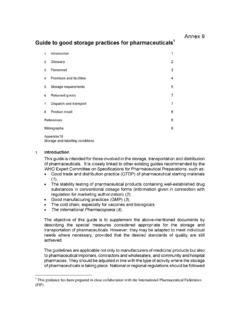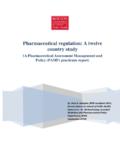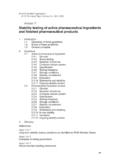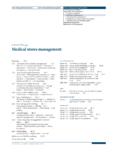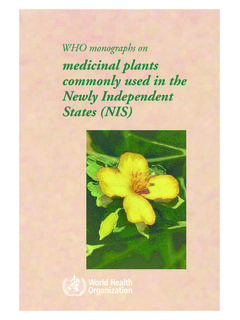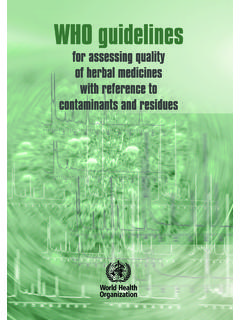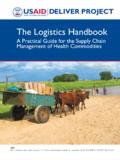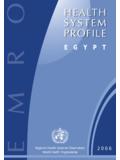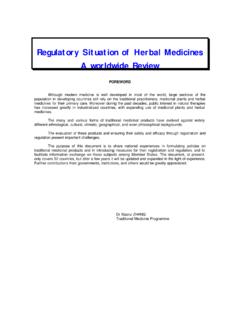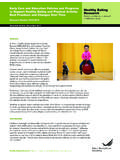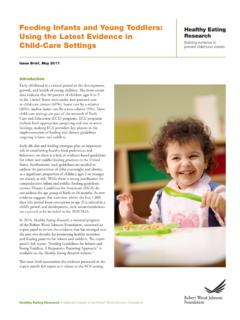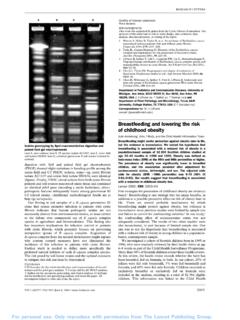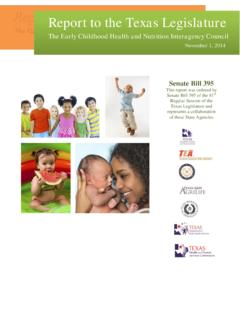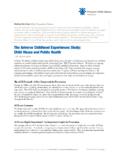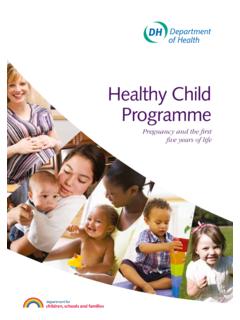Transcription of DIET, NUTRITION AND THE PREVENTION OF CHRONIC …
1 This report contains the collective views of an international group of experts and does not necessarily represent the decisionsor the stated policy of the World Health Organization or of the Food and Agriculture Organization of the United NationsWHO Technical Report Series916 diet , NUTRITION ANDTHE PREVENTION OFCHRONIC DISEASESR eport of aJoint WHO/FAO Expert ConsultationWorld Health OrganizationGeneva 2003 WHO Library Cataloguing-in-Publication DataJoint WHO/FAO Expert Consultation on diet , NUTRITION and the PREVENTION ofChronic Diseases (2002 : Geneva, Switzerland) diet , NUTRITION and the PREVENTION of CHRONIC diseases: report of a joint WHO/FAO expertconsultation, Geneva, 28 January -- 1 February 2002.(WHO technical report series ; 916) disease -- epidemiology -- behavior metabolism of illness 92 4 120916 X(NLM classification: QU 145)ISSN 0512-3054qWorld Health Organization 2003 All rights reserved.
2 Publications of the World Health Organization can be obtained from Marketing andDissemination, World Health Organization, 20 avenue Appia, 1211 Geneva 27, Switzerland (tel: +41 22791 2476; fax: +41 22 791 4857; e-mail: Requests for permission to reproduce ortranslate WHO publications --- whether forsale or fornoncommercial distribution --- should be addressedto Publications, at the above address (fax: +41 22 791 4806; e-mail: designations employed and the presentation of the material in this publication do not imply theexpression of any opinion whatsoever on the part of the World Health Organization concerning the legalstatusofanycountry,territory, cityorareaorofitsauthorities,orconcernin g thedelimitationofitsfrontiersor boundaries. Dotted lines on maps represent approximate border lines for which there may not yet befull mention of specific companies or of certain manufacturers products does not imply that they areendorsed or recommended by the World Health Organization in preference to others of a similar naturethat are not mentioned.))
3 Errors and omissions excepted, the names of proprietary products aredistinguished by initial capital World Health Organization does not warrant that the information contained in this publication iscomplete and correct and shall not be liable for any damages incurred as a result of its publication contains the collective views of an international group of experts and does notnecessarily represent the decisions or the stated policy of the World Health Organization or of the Foodand Agriculture Organization of the United and printed in The global burden of CHRONIC The double burden of diseases in the developing An integrated approach to diet -related and NUTRITION -related diseases and regional food consumption patterns and Developments in the availability of dietary Availability and
4 Changes in consumption of dietary Availability and changes in consumption of animal Availability and consumption of Availability and consumption of fruits and Future trends in demand, food availability and , NUTRITION and CHRONIC diseases in diet , NUTRITION and the PREVENTION of CHRONIC diseasesthrough the life Fetal development and the maternal Childhood and Ageing and older Interactions between early and later factors throughout the life course Clustering of risk Intergenerational Gene--nutrient interactions and genetic Intervening throughout nutrient intake goals for preventing diet -related CHRONIC Overall Strength of A summary of population nutrient intake Recommendations for preventing excess weight gain and diet , physical activity and excess weight gain and Strength of General strategies for obesity Disease-specific Recommendations for preventing diet .
5 Physical activity and Strength of Disease-specific Recommendations for preventing cardiovascular diet , physical activity and cardiovascular Strength of Disease-specific Recommendations for preventing diet , physical activity and Strength of Disease-specific Recommendations for preventing dental diet and dental Strength of Disease-specific Recommendations for preventing diet , physical activity and Strength of Disease-specific directions and recommendations for policy and Policy principles for the promotion of healthy dietsand physical Prerequisites for effective Leadership for effective Effective Functioning alliances and Enabling Strategic actions for promoting healthy diets and physical Surveillance of people s diets.
6 Physical activityand related disease Enabling people to make informed choicesand take effective Making the best use of standards and Ensuring that healthy diet components are available to Achieving success through intersectoral Making the best use of health services and theprofessionals who provide Call to action143 Reference144 Acknowledgements144 AnnexSummary of the strength of evidence for obesity , type 2 diabetes,cardiovascular disease (CVD), cancer, dental disease and osteoporosis148vJoint WHO/FAO Expert Consultation on diet , Nutritionand the PREVENTION of CHRONIC DiseasesGeneva, 28 January--1 February 2002 MembersDr Amine, Dean, High Institute of Public Health, Alexandria University,Alexandria, EgyptDr Baba, Chairperson, Department of NUTRITION and Food Sciences, AmericanUniversity of Beirut, Beirut, LebanonDr M.
7 Belhadj, Professor of Internal Medicine and Diabetologia, Centre HospitalierUniversitaire, Oran, AlgeriaDr M. Deurenberg-Yap, Director, Research and Information Management, HealthPromotion Board, Singapore (Co-Rapporteur)Dr A. Djazayery, Professor of NUTRITION , Department of NUTRITION and Biochemistry,School of Public Health, Tehran University of Medical Sciences, Tehran, IslamicRepublic of IranDr T. Forrester, Director, Tropical Medicine Research Institute, The University of theWest Indies, Kingston, JamaicaDr Galuska, Division of NUTRITION and Physical Activity, National Center forChronic Disease, PREVENTION and Health Promotion, Centers for Disease Controland PREVENTION , Atlanta, GA, USADr S. Herman, Senior Researcher, NUTRITION Research and Development Centre,Ministry of Health, Bogor, IndonesiaProfessor James, Chairman, International obesity Task Force, London,EnglandDr M Buyamba Kabangu, Hypertension Unit, Department of Internal Medicine,University of Kinshasa Hospital, Kinshasa, Democratic Republic of the CongoProfessor Katan, Division of Human NUTRITION and Epidemiology, WageningenUniversity, Wageningen, NetherlandsDr Key, Cancer Research UK, Epidemiology Unit, University of Oxford, TheRadcliffe Infirmary, Oxford, EnglandProfessor S.
8 Kumanyika, Center for Clinical Epidemiology and Biostatistics, School ofMedicine, University of Pennsylvania, Philadelphia, PA, USA (Vice-Chairperson)Professor J. Mann, Department of Human NUTRITION , University of Otago, Dunedin,New ZealandDr Moynihan, School of Dental Sciences, University of Newcastle-upon-Tyne,Newcastle-upon-Tyne, EnglandDr Musaiger, Director, Environmental and Biological Programme, BahrainCentre for Studies and Research, Manama, BahrainDr Olwit, Kampala, UgandaDr J. Petkeviciene, Institute for Biomedical Research, Kaunas Medical University,Kaunas, LithuaniaviDr A. Prentice, Director, Human NUTRITION Research, Medical Research Council,Cambridge, EnglandProfessor Reddy, Department of Cardiology, Cardiothoracic Centre, All IndiaInstitute of Medical Science, New Delhi, IndiaDr A.
9 Schatzkin, Nutritional Epidemiology Branch, National Cancer Institute, NationalInstitute of Health, Rockville, MD, USAP rofessor Seidell, National Institute of Public Health and the Environment,Bilthoven, Netherlands (Co-Rapporteur)Dr Simopoulos, President, The Center for Genetics, NUTRITION and Health,Washington, DC, USAP rofessor S. Srianujata, Director, Institute of NUTRITION , Mahidol University, NakhonPathom, ThailandDr N. Steyn, CHRONIC Diseases of Lifestyle, Medical Research Council, Tygerberg,South AfricaProfessor B. Swinburn, School of Health Sciences, Deakin University, Melbourne,Victoria, AustraliaDr R. Uauy, Institute of NUTRITION and Food Technology, University of Chile, Santiago,Chile; and Department of Epidemiology and Population Health, London School ofHygiene and Tropical Medicine, London, England (Chairperson)Dr M.
10 Wahlqvist, Director, Asia Pacific Health and NUTRITION Centre, Monash AsiaInstitute, Monash University, Melbourne, Victoria, AustraliaProfessor Wu Zhao-Su, Institute of Heart, Lung and Blood Vessel Diseases, Beijing,ChinaDr N. Yoshiike, Division of Health and NUTRITION Monitoring, National Institute of Healthand NUTRITION , Tokyo, JapanRepresentatives of other organizations*UnitedNations Administrative Committee onCoordination/Subcommittee on NUTRITION (ACC/SCN),Dr S. Rabenek, Technical Secretary, ACC/SCN, Geneva, SwitzerlandSecretariat{Dr K. Bagchi, Regional Adviser, NUTRITION , Food Security and Safety, WHO RegionalOffice for the Eastern Mediterranean, Cairo, EgyptDr T. Cavalli-Sforza, Regional Adviser, NUTRITION , WHO Regional Office for the WesternPacific, Manila, Philippines*Unable to attend: International Atomic Energy Agency, Vienna, Austria; Secretariat of the PacificCommunity, Noumea, New Caledonia; United Nations Children s Fund, New York, NY, USA; UnitedNations University, Tokyo, Japan; World Bank, Washington, DC, USA.}
